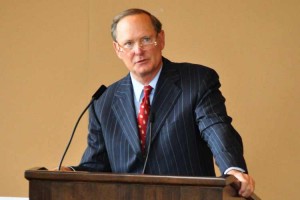USC releases ‘Agents and Athletes’ policy
Three months after improper contact between USC freshman tailback Dillon Baxter and another USC student resulted in Baxter’s suspension from a Nov. 20 game at Oregon State, USC’s Office of Athletic Compliance released a statement Tuesday outlining a new “Athletes and Agents” policy.

Crucial · Since Pat Haden took over as athletic director, the university’s compliance staff has increased in size and prominence. The newly released “Agents and Athletes” policy is intended to further help USC student-athletes remain in good standing with the NCAA. - Anna Wierzbowska | Daily Trojan
The statement, sent via e-mail Tuesday morning to students, staff and faculty noted that USC, in an effort to remain in compliance with NCAA rules, stresses that students and staff members refrain from impermissible conduct with student-athletes.
“We are committed to protecting our student-athletes from any contact, communication or conduct with individuals who seek to inappropriately contact or represent student-athletes before their eligibility is exhausted or voluntarily terminated,” wrote Elizabeth Garrett, provost and senior vice president for academic affairs, and Todd Dickey, senior vice president for administration.
According to the university’s compliance office, the policy is the first of its kind.
“I’m unaware of other universities adopting such a policy,” said Dave Roberts, USC’s vice president for athletic compliance. “With all the press we’ve been getting, you’d think someone would have said they’d had seen a similar policy before.”
Under the policy, students, staff and other third parties are required to notify USC’s compliance office of their involvement with a sports agency before any interaction with student-athletes.
“We’re publishing this to the student body, so they can be aware,” Roberts said. “Of course, somebody could choose to ignore it, but we have to at least be proactive by putting the policy in place.”
Specifically, the new regulations stipulate that all such parties provide written notification to the school’s compliance office within 24 hours of their involvement with a sports agency or similar marketing agency.
Those found to be in violation of the policy would then be subject to remedial action and/or discipline, according to the release.
“I don’t think it’ll force a divide between students and student-athletes,” Roberts said. “It should only be an issue for certified agents.”
Last November, Baxter accepted a ride in a golf cart from a student, Teague Egan, who at the time was a National Football League Players Association-certified agent, in addition to founder and CEO of 1st Round Enterprises, a marketing agency that seeks to represent athletes and musicians.
“We have been exploring agent issues since June,” Roberts said. “1st Round accelerated the process and was the driving force behind the policy, but we had been looking at this before.”
Eventually, Baxter was declared eligible for USC’s final two games of the season after donating $5 to a local charity as repayment for the ride.
“The idea of a student-agent had not crossed anyone’s mind,” Roberts said.
Although USC met with the NCAA Infractions Appeals Committee last month in Indianapolis, the recently announced policy is said to be entirely unrelated to the athletic department’s efforts to have NCAA-levied sanctions lessened.
“It’s completely, 100 percent separate,” Roberts said. “What the appeals committee sees is what we did in the past. The policy does not touch the appeal. It is forward-looking, and hopefully we can show the NCAA that we’re doing everything we can to police.”
The idea for the policy did come at least partially from USC’s athletic department, which is separate from compliance.
“We do work closely with athletics,” Roberts said. “They’re supportive of it. At request of their office, we were able to put this in place.”
